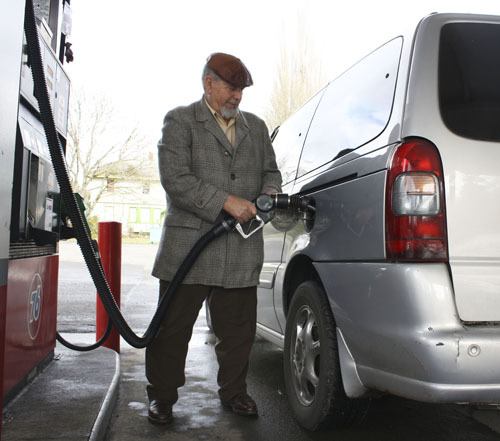If gas on Vashon remains over $4 a gallon much longer, Anthony Balbas figures he will have to start riding the bus.
Balbas, who paid $50 to put about half a tank of regular gas in his minivan at the 76 station last week, said the Island’s rising gas prices have been hitting his budget hard.
“I live on Social Security, so I see a point in the future when I won’t be driving,” he said, adding that he knows other senior citizens have already given up driving for the same reason.
“For some of us it’s difficult because we have a limited income,” he said.
The whole nation has seen rising prices at the pump in recent weeks due to political unrest in the Middle East and North Africa, sending oil prices to around $107 a barrel this week, the higest rate in a little over two years. And, as usual, Vashon drivers are paying even more to fill up on the Island.
According to AAA statistics, average gas prices in the United States jumped 27 cents in February, from $3.10 to $3.37. Most of the spike occurred during the last part of the month, after Libya — a major oil producing nation — plunged into chaos.
Early this week, the national average was $3.51 per gallon, and Washingtonians paid about $3.60 at the pump. Islanders, however, shelled out about $4.25 a gallon to fill up in town.
Ron Lewis, who remembers paying 35 cents a gallon for gas on Vashon years ago, expressed similar frustrations as Balbas. Like many Islanders, Lewis tries to fill up his truck off-Island as much as possible and said he has made trips to Tacoma just to get gas.
“I’d rather pay the ferry fare because it’s $10 cheaper over there, and it’s nice to be able to stop and say hi to friends in Tacoma,” he said.
Lewis, who lived in Hawaii for a time, said he was shocked when he recently returned to Vashon to find that gas was 10 cents a gallon more than what he paid in Hawaii.
“We’re getting slammed,” he said, “I think we’re paying probably the highest prices in the U.S.”
Though Vashon may not be the most expensive place in the county to buy gas right now, it’s certainly in the running for that title. According to AAA, the major city with the most expensive gas early this week was San Diego, where prices averaged $3.97 a gallon on Monday, about a quarter less than in Vashon town.
Paul Engels, owner of Engels Repair & Towing on Maury Island, says that although his current price of $3.99 a gallon for regular gasoline does attract customers, it’s not completely his choice. The station’s pumps, which were purchased a dozen years ago, were not created to handle rates over $4, he said.
“I guess at that time they didn’t anticipate gas would ever get over $4 a gallon,” he said.
The station has already altered the super and mid-range gasoline pumps to charge twice as much as the rate the pump is set at, making it possible to charge customers more than $4 a gallon for those choices.
Engels said that if gas prices stay high or get higher, the station may make a similar fix to the regular gas pumps, as entirely replacing them would be costly.
“Everything would have to go digital, and it would be a lot of money,” he said.
Desirae Smith, who works at the 76 station at Mom’s Deli, said that although the station’s regular gas hit $4 a gallon on March 1 and has been rising since, the high prices haven’t seemed to discourage Islanders from visiting the station. However, she added, some put less gas in their car in anticipation of going off-Island.
“We get more complaints about it, but they still (buy gas),” she said.
Bill Moyer, director of Vashon’s Bakbone Campaign, said he would cringe less at the pump if he knew some of his cash were going toward the development of sustainable engery resources.
He believes the country’s infrastructure is built around gas, with profits going to big oil companies instead of subsidizing alternative energy.
“Unless you change the infrastructure that everyone is dependent upon, we’re all still caught in the same system that requires us to burn fossil fuels,” he said.
And while some are warning about even higher gas prices around the corner, most economists, according to the Associated Press, say future gas prices will depend largely on the political climate in Libya, which has cut its oil production by more than half since conflict began there last month. If violence continues, or spreads to other countries, gas could remain high for at least several months.
If that’s the case, Balbas, who currently pays about $90 to completely fill his minivan’s tank, may be trading in his keys for a bus pass.
“That, or get a ride to the store with a friend,” he said.



